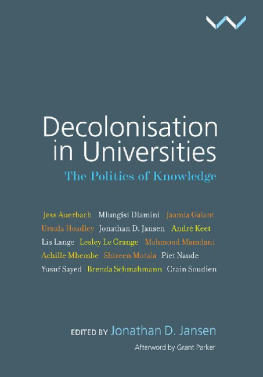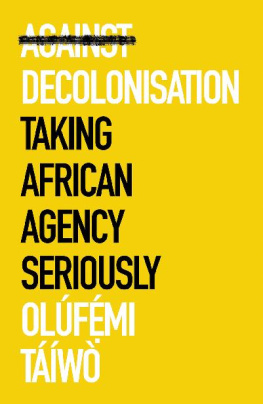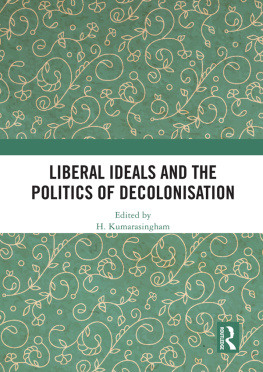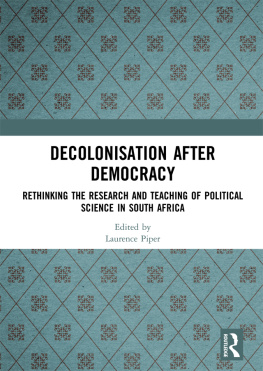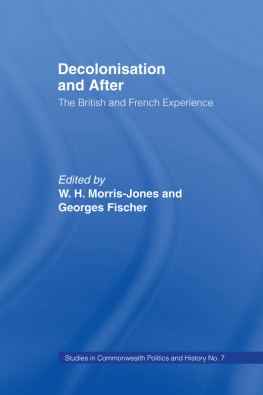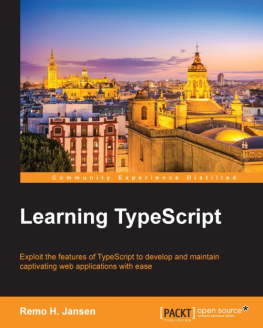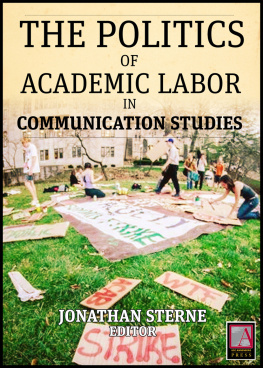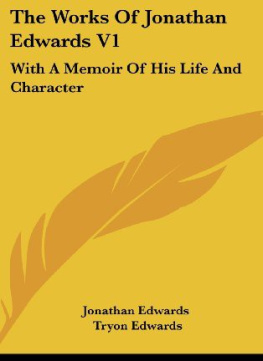Jonathan D. Jansen - Decolonisation in Universities: The Politics of Knowledge
Here you can read online Jonathan D. Jansen - Decolonisation in Universities: The Politics of Knowledge full text of the book (entire story) in english for free. Download pdf and epub, get meaning, cover and reviews about this ebook. year: 2019, publisher: Wits University Press, genre: Politics. Description of the work, (preface) as well as reviews are available. Best literature library LitArk.com created for fans of good reading and offers a wide selection of genres:
Romance novel
Science fiction
Adventure
Detective
Science
History
Home and family
Prose
Art
Politics
Computer
Non-fiction
Religion
Business
Children
Humor
Choose a favorite category and find really read worthwhile books. Enjoy immersion in the world of imagination, feel the emotions of the characters or learn something new for yourself, make an fascinating discovery.
- Book:Decolonisation in Universities: The Politics of Knowledge
- Author:
- Publisher:Wits University Press
- Genre:
- Year:2019
- Rating:4 / 5
- Favourites:Add to favourites
- Your mark:
- 80
- 1
- 2
- 3
- 4
- 5
Decolonisation in Universities: The Politics of Knowledge: summary, description and annotation
We offer to read an annotation, description, summary or preface (depends on what the author of the book "Decolonisation in Universities: The Politics of Knowledge" wrote himself). If you haven't found the necessary information about the book — write in the comments, we will try to find it.
Decolonisation in Universities: The Politics of Knowledge — read online for free the complete book (whole text) full work
Below is the text of the book, divided by pages. System saving the place of the last page read, allows you to conveniently read the book "Decolonisation in Universities: The Politics of Knowledge" online for free, without having to search again every time where you left off. Put a bookmark, and you can go to the page where you finished reading at any time.
Font size:
Interval:
Bookmark:
Decolonisation in Universities
Decolonisation in Universities
The Politics of Knowledge
EDITED BY Jonathan D. Jansen

Published in South Africa by:
Wits University Press
1 Jan Smuts Avenue
Johannesburg 2001
www.witspress.co.za
Compilation Editor 2019
Chapters Individual contributors 2019
Published edition Wits University Press 2019
Images and figures Copyright holders
First published 2019
http://dx.doi.org.10.18772/22019083351
978-1-77614-335-1 (Paperback)
978-1-77614-336-8 (Web PDF)
978-1-77614-337-5 (EPUB)
978-1-77614-338-2 (Mobi)
All rights reserved. No part of this publication may be reproduced, stored in a retrieval system, or transmitted in any form or by any means, electronic, mechanical, photocopying, recording or otherwise, without the written permission of the publisher, except in accordance with the provisions of the Copyright Act, Act 98 of 1978.
All images remain the property of the copyright holders. The publishers gratefully acknowledge the publishers, institutions and individuals referenced in captions for the use of images. Every effort has been made to locate the original copyright holders of the images reproduced here; please contact Wits University Press in case of any omissions or errors.
Project manager: Elaine Williams
Copyeditor: Colin Bundy
Proofreader: Alison Lockhart
Indexer: Elaine Williams
Cover design: Hothouse South Africa
Typesetter: Newgen
Typeset in 10.5 point Minion Pro
Contents
Jonathan D. Jansen, Stellenbosch University
Mahmood Mamdani, Makerere University and Columbia University
Lesley Le Grange, Stellenbosch University
Jonathan D. Jansen, Stellenbosch University
Lis Lange, University of Cape Town
Ursula Hoadley and Jaamia Galant, University of Cape Town
Jess Auerbach, Open University of Mauritius, Mlungisi Dlamini and Anonymous
Crain Soudien, Human Sciences Research Council
Yusuf Sayed and Tarryn de Kock, University of Sussex, Shireen Motala, University of Johannesburg
Brenda Schmahmann, University of Johannesburg
Andr Keet, Nelson Mandela University
Piet Naud, Stellenbosch University
Achille Mbembe, University of the Witwatersrand
Grant Parker, Stanford University and Stellenbosch University
List of Figures
CHAPTER 3
CHAPTER 9
.
.
.
.
.
.
Acronyms and Abbreviations
| ANC | African National Congress |
| ASC | Africas Core |
| CAPRISA | Centre for the AIDS Programme of Research in South Africa |
| CAS | Centre for African Studies |
| CHE | Council on Higher Education |
| CPUT | Cape Peninsula University of Technology |
| DE | Development Education |
| EASE | East African Society and Environment |
| EFF | Economic Freedom Fighters |
| HBU | historically black university |
| HEI | higher education institution |
| HRE | human rights education |
| HWU | historically white university |
| IDS | Institute of Development Studies |
| IKS | indigenous knowledge systems |
| IMF | International Monetary Fund |
| ISA | Income Sharing Agreement |
| ITE | initial teacher education |
| NQF | National Qualifications Framework |
| NRF | National Research Foundation |
| OBE | outcomes-based education |
| PEZ | Political Economy of Zimbabwe |
| RAU | Rand Afrikaans University |
| #RMF | Rhodes Must Fall |
| SACE | South African Council for Educators |
| SACHED | South African Committee for Higher Education |
| SAQA | South African Qualifications Authority |
| SARChI | South African Research Chairs Initiative |
| UCT | University of Cape Town |
| UFH | University of Fort Hare |
| UFS | University of the Free State |
| UJ | University of Johannesburg |
| UNISA | University of South Africa |
| UP | University of Pretoria |
| UWC | University of the Western Cape |
| Wits | University of the Witwatersrand |
INTRODUCTION AND OVERVIEW
Making Sense of Decolonisation in Universities
Jonathan D. Jansen
Stellenbosch University

The student protests starting in 2015 added a new term to the lexicon of South African universities decolonisation. It is of course a word with a long history dating back to the anti-colonial struggles of the 1950s and extending to the postcolonial period to signal ongoing efforts to undo the legacies of colonialism. But decolonisation had never been a prominent or sustained component of the struggle discourse under or after apartheid. The discursive terminologies of the struggle included terms like anti-apartheid education, liberation pedagogy, reconstruction and development education, and of course that ubiquitous referent, transformation. Literally overnight, the word decolonisation rolled off the lips of activists, bannered everyday protests and initiated across mainly the formerly white campuses seminars, conferences and committees to determine meanings and methods for changing universities their complexions, cultures and curricula.
This book brings together the best curriculum minds in South Africa to make sense of decolonisation as a signal moment in the century-old history of higher education in South Africa. What does the word even mean? Why does it emerge at this moment, more than 20 years into democracy? Where does the press for decolonisation come from intellectually, socially, culturally and politically? How does it relate to associated concepts such as Africanisation or indigenous education or postcolonial education? Is decolonisation the appropriate response, substantively and strategically, to the complex of problems gripping the education system in South Africa? Does the term decolonisation carry much validity in a country last formally colonised more than 100 years ago? Or is decolonisation simply a byword for proxy discontents in education and society? And what does decolonisation imply for the nature, purposes and politics of curriculum?
THE CONCEPTUAL ORIENTATION OF THE BOOK
In the literature, decolonisation is a concept that has been applied broadly to various things, from changes to the artworks of a university to the social transformation of entire nations. The specific focus of this book, however, is primarily on decolonisation as applied to the university curriculum; that is, as a knowledge project.
The question of knowledge as framed in this book is a political subject and therefore the decolonisation thesis is interrogated from the viewpoint of The Politics of Knowledge, as reflected in the subtitle of this volume. There is in fact a long and continuing tradition of scholarship on the politics of knowledge in political studies more broadly (Neave 2006; Dominguez Rubio and Baert 2012) and in curriculum studies more specifically (Apple 1979; Lim and Apple 2016).
The starting point of this tradition is that knowledge is never neutral. Who produces knowledge, what knowledge is produced and what knowledge is left out are central questions of inquiry within the politics of knowledge. This is what Michael Apple (1993) calls the selective tradition or what Elliot Eisner (1985) once referenced as the null curriculum that what is left out in the choice of knowledge is consequential for both social and disciplinary learning. Those knowledge choices, critical theorists would argue, are political decisions vested in authorities like the government in power, commercial textbook publishers and international funding agencies (Littoz-Monnet 2017).
Next pageFont size:
Interval:
Bookmark:
Similar books «Decolonisation in Universities: The Politics of Knowledge»
Look at similar books to Decolonisation in Universities: The Politics of Knowledge. We have selected literature similar in name and meaning in the hope of providing readers with more options to find new, interesting, not yet read works.
Discussion, reviews of the book Decolonisation in Universities: The Politics of Knowledge and just readers' own opinions. Leave your comments, write what you think about the work, its meaning or the main characters. Specify what exactly you liked and what you didn't like, and why you think so.

